
-
Find the right food for your petTake this quiz to see which food may be the best for your furry friend.Find the right food for your petTake this quiz to see which food may be the best for your furry friend.Health CategoryFeatured products
 Adult Perfect Digestion Chicken, Barley & Whole Oats Recipe Dog Food
Adult Perfect Digestion Chicken, Barley & Whole Oats Recipe Dog FoodScience Diet's breakthrough nutrition supports ultimate digestive well-being & healthy microbiome
Shop Now Hill's Science Diet Adult Healthy Mobility Large Breed Chicken Meal, Barley & Brown Rice Recipe Dog Food
Hill's Science Diet Adult Healthy Mobility Large Breed Chicken Meal, Barley & Brown Rice Recipe Dog FoodAdvanced nutrition shown to support joint health and improve mobility
Shop Now Adult Perfect Weight & Joint Support Chicken & Brown Rice Recipe Dog Food
Adult Perfect Weight & Joint Support Chicken & Brown Rice Recipe Dog FoodThis weight management and mobility support dog food was created with Hill’s unique understanding of the biology of overweight dogs.
Shop NowFeatured products Adult Healthy Cuisine Roasted Chicken & Rice Medley Cat Food
Adult Healthy Cuisine Roasted Chicken & Rice Medley Cat FoodDelicious roasted chicken and rice in a mouthwatering sauce
Shop Now Adult Perfect Digestion Chicken, Barley & Whole Oats Recipe Cat Food
Adult Perfect Digestion Chicken, Barley & Whole Oats Recipe Cat FoodHill's Science Diet's breakthrough nutrition supports ultimate digestive well-being & healthy microbiome
Shop Now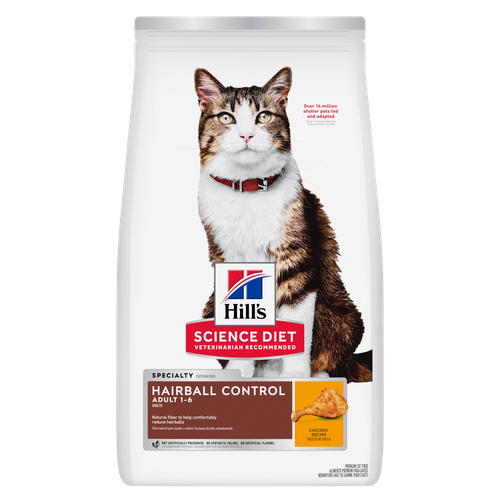 Adult Hairball Control Chicken Recipe Cat Food
Adult Hairball Control Chicken Recipe Cat FoodNatural fibre comfortably reduces hairballs
Shop Now -
DogCat
- Cat Tips & Articles
-
Health Category
- Weight
- Skin & Food Sensitivities
- Urinary
- Digestive
- Kidney
- Dental
- Serious Illness
-
Life Stage
- Kitten Nutrition
- Adult Nutrition
Featured articles Fun Ideas for Kids and Pets This Summer
Fun Ideas for Kids and Pets This SummerOutdoor summer activities with your dog or cat can be fun for kids, too. Learn how they also teach kids responsibility & creates a bond with their pet.
Read More Water
WaterWater is the most important nutrient of all and essential for life. Animals can lose almost all their fat and half their protein and still survive, but if they lose 15% of their water, it will mean death.
Read More Tips on How to Store Your Dog or Cat Food Properly
Tips on How to Store Your Dog or Cat Food ProperlyWhere you store your cat and dog food can make a big difference in the quality and freshness once it is opened. Here are some common questions and recommendations for optimal storage for all of Hill’s dry and canned cat and dog food.
Read More -


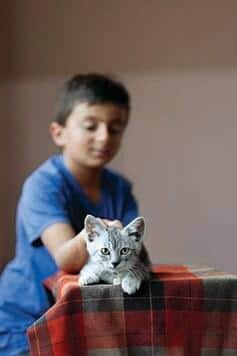
Congratulations on bringing home a new kitten! Still, you may be a bit nervous. After all, there are some illnesses that are common to new kittens. Below are six common health issues to look out for. Just remember that your kitten is less likely to contract a health issue if you feed her a healthy kitten food. Good kitten food will help her immune system develop in early days.
1. Upper Respiratory Infections
Upper respiratory infections, like feline calicivirus and feline herpes virus, are “kitten killers, especially if the cats are just a few weeks old,” says Dr. Tony Johnson, DVM, DACVECC, clinical assistant professor, emergency and critical care, Purdue University College of Veterinary Medicine West Lafayette, IN. Upper respiratory infections in cats are typically caused by bacteria or viruses, which are passed along when other cats sneeze or exhale.
Symptoms:
Sneezing is the main symptom of upper respiratory infections in cats, though sometimes kittens will develop a yellowy goopy discharge from their eyes and a runny nose. If your kitten is having trouble breathing or refuses to eat, the situation is more serious.
Treatment:
Take your kitten to your veterinarian. “If she’s eating and drinking and feeling comfortable and breathing, it can probably wait until the next day, but otherwise, an emergency visit is best,” Dr. Johnson says. Upper respiratory infections in cats are very hard to treat, especially the viral ones since there are no effective anti-viral medications.
Recovery time:
After five to seven days, upper respiratory infections in cats tend to wane. However, some linger longer and the feline herpes virus can even remain dormant in your cat’s body, only to resurface and cause another upper respiratory infection later in her life.
2. Feline Distemper
Feline distemper (panleukopenia) is pretty rare, but is very nasty and can be lethal. It’s a virus that attacks your kitten’s immune system, depleting it to nothing, meaning distemper is almost untreatable. Feline distemper vaccines are available and routinely given. Feline distemper is transmitted through the fecal-oral route and even just a microscopic amount of contaminated stool can pass it on.


Tasty Tips
Symptoms:
Kittens with feline distemper are usually extremely ill, suffering from vomiting, lack of ,appetite, and a horrible, mucus-like white diarrhea.
Treatment:
Kittens suffering from feline distemper need to be hospitalized and isolated so they don’t transmit this virus. Veterinarians often give them antibiotics and lots of fluids to prevent secondary infections.
3. Intestinal worms
Intestinal worms in cats come in many varieties, all of which are unpleasant and can be dangerous. Roundworms, hookworms, and whipworms, for instance, can burrow into your kitten’s intestine and cause diarrhea (sometimes with blood), weight loss, and failure to thrive.
Kittens develop worms through ingesting worm eggs from another cat’s fecal matter. Humans can also contract worms (e.g., visceral larva migrains) by eating fruit or vegetables that were in contact with infected soil and not washed thoroughly before eating.
Symptoms:
Weight loss and diarrhea.
Treatment:
Routinely have your kitten dewormed by your vet, beginning at about eight weeks old. There are lots of cat deworming products. These are available over the counter “but veterinarians carry the good stuff,” Dr. Johnson says. Additionally, it's important your veterinarian examines a stool sample to identify which type of worm your kitten has, as certain medications may be better suited for certain types of cat worms.
Recovery time:
Two weeks. Dr. Johnson adds that there’s a re-infection risk. “Kittens can consume the eggs they passed a couple of weeks ago.”
For the complete article on 6 Issues to Watch for in Kittens, visit petMD.


One of our staff authors prepared this article for you
Related products

Healthy digestion for easy litter box clean-up

Hill's Science Diet's breakthrough nutrition supports ultimate digestive well-being & healthy microbiome

Delicious roasted chicken and rice in a mouthwatering sauce

Natural fibre comfortably reduces hairballs
Related articles
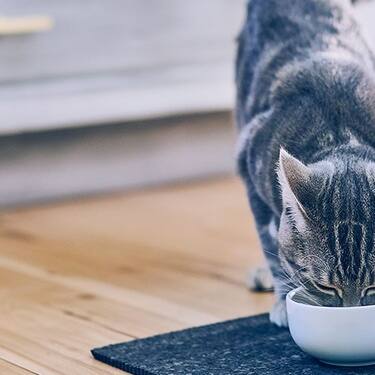
Understand the symptoms of a chronic upset stomach in your cat, and learn how to help sooth their discomfort.
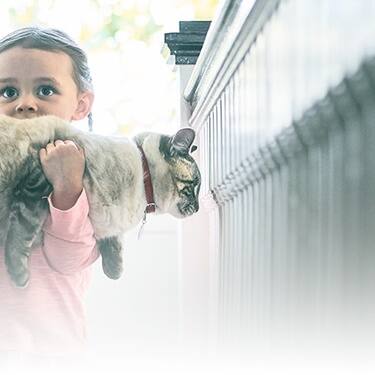
Provide the best possible treatment for cats with sensitive skin by spotting the signs, knowing the causes, and understanding the remedies. Learn more now.
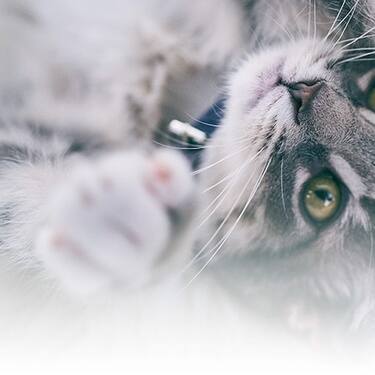
Obesity affects more than 30 percent of cats in America. Learn how you can properly feed and exercise your cat to improve its weight management.
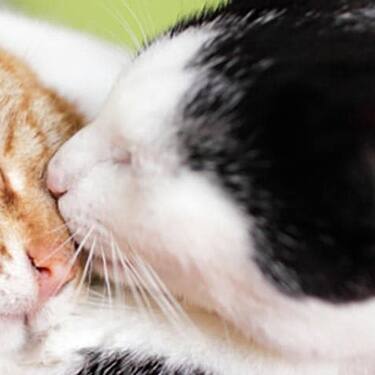
Being overweight puts a cat at risk for developing many serious health issues. Weight gain indicates an increase in body fat and usually results when your cat eats too much and exercises too little.

Put your cat on a diet without them knowing
Our low calorie formula helps you control your cat's weight. It's packed with high-quality protein for building lean muscles, and made with purposeful ingredients for a flavorful, nutritious meal. Clinically proven antioxidants, Vitamin C+E, help promote a healthy immune system.
Put your cat on a diet without them knowing
Our low calorie formula helps you control your cat's weight. It's packed with high-quality protein for building lean muscles, and made with purposeful ingredients for a flavorful, nutritious meal. Clinically proven antioxidants, Vitamin C+E, help promote a healthy immune system.

